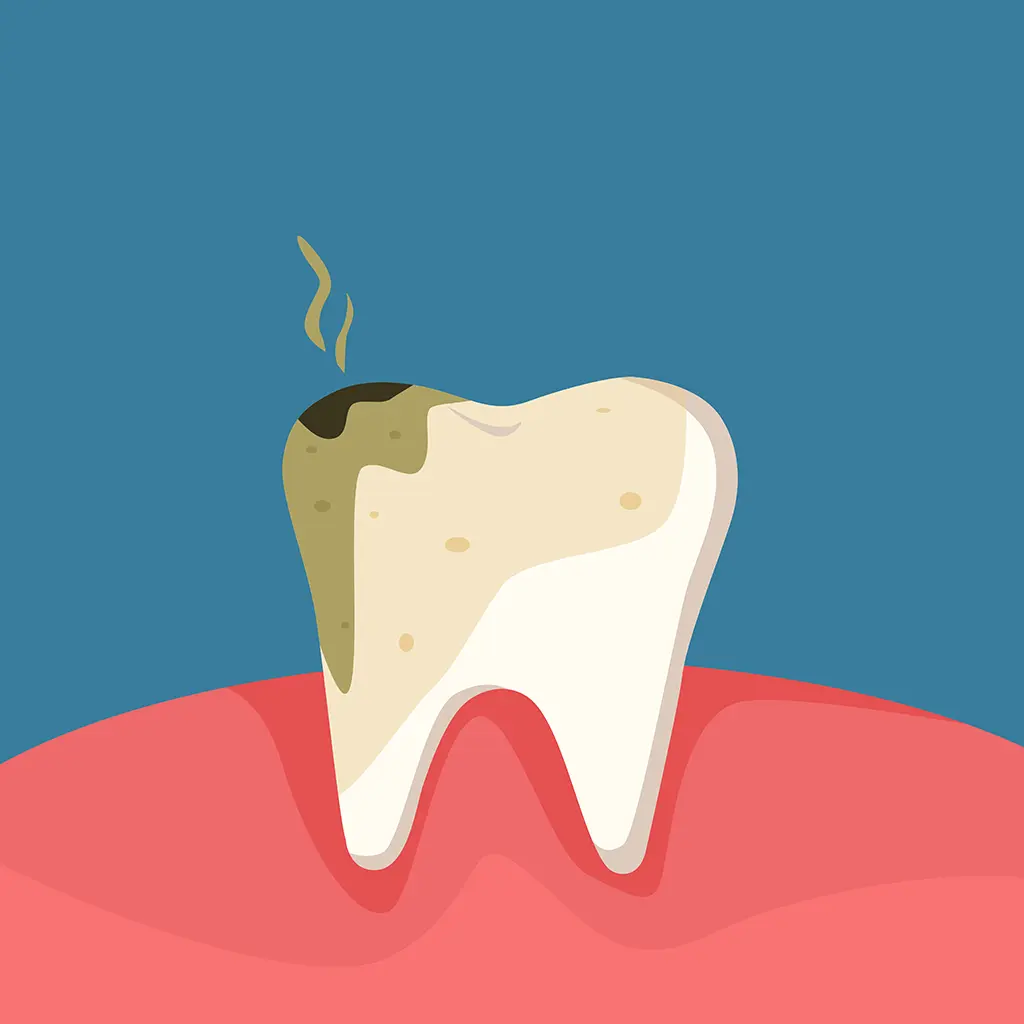
Tooth decay is one of the most common dental problems affecting people of all ages worldwide. Despite advances in dental care, many individuals still struggle with this pervasive issue. If left untreated, it can lead to severe oral health problems and impact overall health. In this comprehensive article, we’ll explore the causes of tooth decay, its effects on oral and overall health.
What is Tooth Decay?
Tooth decay, also known as dental caries or cavities, is the destruction of the tooth’s enamel, the hard outer layer of the teeth. This process occurs when the bacteria in the mouth produce acids that erode the enamel. If left unchecked, it can progress deeper into the tooth, affecting the dentin and pulp, leading to pain, infection, and even tooth loss.
Causes of Tooth Decay
Understanding the causes is essential in preventing and managing this condition. Several factors contribute to its development, including:
1. Poor Oral Hygiene
One of the leading causes of tooth decay is inadequate oral hygiene. Failure to brush and floss regularly allows plaque, a sticky film of bacteria, to build up on the teeth. Plaque bacteria produce acids that attack the enamel, leading to decay.
2. Diet High in Sugars and Carbohydrates
Foods and drinks high in sugars and carbohydrates provide a rich food source for the bacteria in plaque. When these bacteria metabolize sugars, they produce acids that can erode the enamel. Frequent consumption of sugary snacks, sodas, and even certain fruits can increase the risk of tooth decay.
3. Lack of Fluoride
Fluoride is a mineral that helps strengthen tooth enamel and makes it more resistant to acid attacks. A lack of fluoride, whether from drinking water, toothpaste, or professional treatments, can make teeth more susceptible to decay.
4. Dry Mouth
Saliva plays a crucial role in maintaining oral health by washing away food particles and neutralizing acids produced by bacteria. Conditions that reduce saliva production, such as certain medications, medical treatments, or diseases, can increase the risk of tooth decay.
5. Poor Dietary Habits
Frequent snacking and sipping on sugary beverages throughout the day provide a constant supply of fuel for bacteria, leading to prolonged acid attacks on the teeth. It’s essential to limit sugary snacks and drinks and maintain a balanced diet to prevent decay.
6. Tooth Shape and Position
Teeth with deep grooves and pits are more susceptible to decay because these areas can trap food particles and bacteria. Similarly, crowded or misaligned teeth can be harder to clean effectively, increasing the risk of decay.
Effects of Tooth Decay on Oral Health
Tooth decay can have significant consequences for oral health if left untreated. Here are some of the primary effects:
1. Pain and Sensitivity
As tooth decay progresses, it can cause pain and sensitivity, especially when consuming hot, cold, or sweet foods and drinks. This discomfort can affect daily activities and quality of life.
2. Infection and Abscesses
If decay reaches the pulp, the innermost part of the tooth containing nerves and blood vessels, it can lead to infection. An untreated infection can result in a dental abscess, a painful, pus-filled swelling that requires prompt treatment.
3. Tooth Loss
Advanced tooth decay can weaken the tooth structure to the point where the tooth becomes loose or needs to be extracted. Tooth loss can impact chewing, speaking, and the appearance of your smile.
4. Gum Disease
Tooth decay can also contribute to gum disease. Bacteria from decayed teeth can spread to the gums, causing inflammation, bleeding, and infection. Gum disease, if left untreated, can lead to further tooth loss and other serious health issues.

Effects of Tooth Decay on Overall Health
Oral health is closely linked to overall health. The effects of tooth decay can extend beyond the mouth and impact various aspects of general health:
1. Cardiovascular Disease
Research has shown a connection between oral health and cardiovascular health. The bacteria from infected teeth and gums can enter the bloodstream and contribute to the development of heart disease, stroke, and other cardiovascular conditions.
2. Respiratory Infections
Inhalation of bacteria from decayed teeth and infected gums can lead to respiratory infections, such as pneumonia. This risk is particularly significant for individuals with compromised immune systems or existing respiratory conditions.
3. Diabetes
People with diabetes are more susceptible to infections, including those in the mouth. Conversely, severe gum disease and tooth decay can make it more challenging to control blood sugar levels, creating a detrimental cycle.
4. Pregnancy Complications
Poor oral health, including untreated tooth decay, has been linked to pregnancy complications such as preterm birth and low birth weight. Maintaining good oral hygiene is essential for expectant mothers to ensure a healthy pregnancy.
What Can I Do About Tooth Decay?
Preventing and managing tooth decay requires a proactive approach to oral health. Here are some effective strategies to consider:
1. Maintain a Consistent Oral Hygiene Routine
Brush your teeth at least twice a day with fluoride toothpaste and floss daily to remove plaque and food particles from between your teeth. Consider using an antibacterial mouthwash to further reduce bacteria.
2. Limit Sugary Foods and Beverages
Reduce your intake of sugary snacks, sodas, and other carbohydrate-rich foods. Opt for healthier alternatives like fruits, vegetables, and dairy products. Drink plenty of water to help rinse away food particles and acids.
3. Use Fluoride Products
Incorporate fluoride into your oral care routine by using fluoride toothpaste and mouthwash. If necessary, your dentist can provide professional fluoride treatments to strengthen your enamel.
4. Stay Hydrated
Drink water throughout the day to maintain saliva production and keep your mouth hydrated. Chewing sugar-free gum can also stimulate saliva flow.
5. Visit Your Dentist Regularly
Regular dental check-ups and cleanings are crucial for detecting and addressing tooth decay early. Your dentist can identify problem areas, provide professional cleanings, and recommend personalized preventive measures.
6. Consider Dental Sealants
Dental sealants are a protective coating applied to the chewing surfaces of the back teeth. They help prevent decay by sealing off grooves and pits where food particles and bacteria can accumulate.
7. Treat Dry Mouth
If you experience dry mouth, talk to your dentist about potential solutions. Staying hydrated, using saliva substitutes, and avoiding tobacco and alcohol can help alleviate dry mouth symptoms.
Conclusion
Tooth decay is a preventable and manageable condition that requires a proactive approach to oral health. By understanding the causes of tooth decay and its effects on oral and overall health, you can take steps to protect your teeth and maintain a healthy smile. Remember, maintaining good oral hygiene, limiting sugary foods, using fluoride products, and visiting your dentist regularly are essential practices in preventing tooth decay.
At Legacy Smiles, we are committed to helping you achieve and maintain optimal oral health. If you’re wondering, what can I do about tooth decay?, Dr. Kolten Astle and our team is here to provide personalized care and support. Schedule a consultation with Legacy Smiles today and take the first step towards a healthier, brighter smile.

